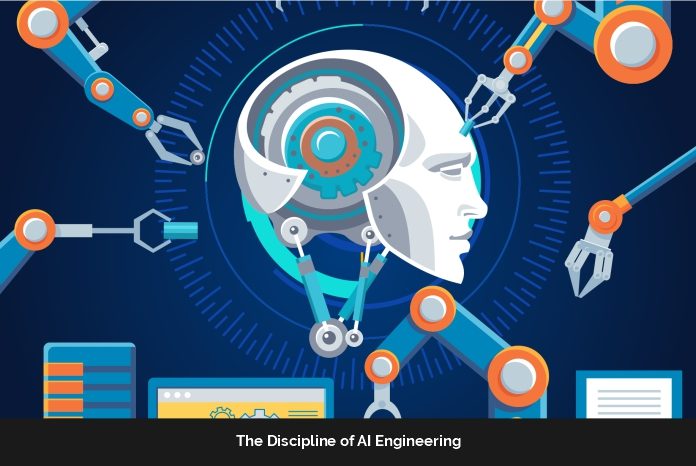Artificial intelligence (AI) is a branch of computer science that involves programming machines to think like human brains. Generative artificial intelligence (AI) is proving to be a powerful tool for a broad range of engineering disciplines, offering highly streamlined processes and work products, and providing invaluable insights for industry leaders.
AI Engineering is taking shape as a discipline already across different organizations and institutions. AI Engineering is a research and practice that integrates systems engineering, software engineering, computer science, and human-centered design to create AI systems tailored to human needs for mission outcomes.
What is an AI Engineer?
AI engineers use machine learning algorithms and deep learning neural networks to create AI models for business insights, influencing organizational decisions. They have a strong understanding of programming, software engineering, and data science, using various tools to process data and develop and maintain AI systems.
The type of applications created by AI engineers include:
- Contextual advertising based on sentiment analysis
- Language translation
- Visual identification or perception
All vertical industries continue to adopt emerging tools and methodologies, but the impact of generative AI in engineering disciplines stands out from the rest.
Why Everyone is Seeking AI Engineers: An Emerging Trend That Is Here to Stay
Many industries have realized that the combination of AI machines and human employees can boost productivity and generate huge revenues in a competitive market. Even governments have begun to allocate millions of dollars for research and development in the field of AI. This growth is fueling the demand for talent in a number of related disciplines, including AI engineering.
The development and deployment of AI capabilities require a strong engineering discipline to guide their development. AI Engineering provides a framework and tools for proactive design of AI systems for complex, ambiguous, and dynamic environments.
The discipline of AI engineering aims to equips practitioners to develop enterprise-to-edge systems, anticipate changing environments, and transform human needs into understandable, ethical, and trustworthy AI.
Engineers with artificial intelligence play an incredibly important role in today’s economy, especially in sectors and verticals where AI technologies have already had a significant impact. Let’s have a look at a handful of the industries that use these technologies:
- How can generative AI be used in software engineering?
Software engineering is the science and art of designing, developing, and maintaining software systems that power our societies, providing the foundational technology for the modern digital world, including mobile applications and AI algorithms.
Generative AI offer transformative solutions for software engineering, automating and optimizing various aspects, making it faster, more efficient, and robust.
- How can generative AI be used in data engineering?
Data engineering is a specialized field that facilitates data-driven decision-making in organizations by designing, constructing, and maintaining architectures, databases, and processing systems to transform raw data into actionable insights.
Data engineers ensure data availability, reliability, and format for analysis. As data volume and variety increase, data engineering becomes complex, necessitating disruptive tools like generative AI for on-demand insights.
- How can generative AI be used in mechanical engineering?
Mechanical engineering involves designing, analyzing, and manufacturing various mechanical systems, from simple mechanisms like levers and pulleys to complex machinery like aircraft engines and robotic arms.
Mechanical engineers are utilizing generative AI to enhance efficiency, sustainability, and safety in machines, enhancing design, material utilization, and maintenance prediction, making it a crucial technology in the engineering field.
- How can generative AI be used in civil engineering?
Civil engineering is a crucial field that designs and maintains infrastructure, ensuring communities are functional, safe, and sustainable, while addressing complex challenges like urban development and traffic congestion.
Rapid urbanization and climate change necessitate civil engineering’s critical role, with generative AI offering innovative solutions for infrastructure design, disaster prediction, and resource allocation.
- How can generative AI be used in electrical engineering?
Electrical engineering is crucial for modern technologies, including power generation, distribution, electronics, telecommunications, and control systems. As society becomes more interconnected and energy-conscious, it faces challenges like renewable energy integration, data security, and automation.
Generative AI offer innovative solutions for automating circuit design, optimizing energy management, and enhancing signal-processing techniques, enabling efficient, reliable, and sustainable systems that can shape a brighter future.
- How can generative AI be used in aerospace engineering?
Aerospace engineering is a specialized field that designs aircraft, spacecraft, and related systems. It focuses on aerodynamics, propulsion systems, structural design, and navigation.
As humankind aims for space tourism and interplanetary colonization, aerospace engineering becomes increasingly pivotal. The field is ripe for innovation, especially in fuel efficiency, safety, and environmental sustainability. Generative AI offers solutions for optimizing aircraft designs, enhancing navigation systems, and improving fuel consumption.
Conclusion
Generative AI and machine learning are revolutionizing the engineering landscape by optimizing and accelerating processes across various disciplines. They are essential for modern engineering, making it crucial for businesses and engineering leaders to embrace these technologies to stay competitive and future-ready.





